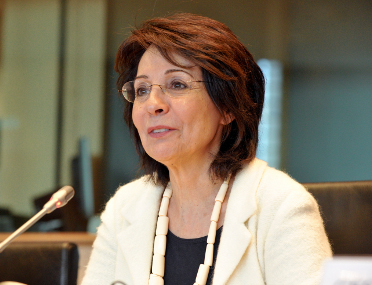Speech at the ESRT conference on "The Implementation of the European Maritime Security Strategy"

Commissioner Damanaki delivered today a keynote address during the Conference organised by the European Security Round Table (ESRT), focusing on the path towards a comprehensive and effective EU Maritime Security Strategy".
Within ESRT, relevant actors from the EU and NATO discuss crucial topics as well as the European security and defence issues.
Read Commissioner Damanaki's keynote speech below.

Speech at the ESRT conference on "The Implementation of the European Maritime Security Strategy"
Brussels, 14 May 2014
Your Excellencies,
Ladies and Gentlemen,
I am more than happy to be here and meet so many people who work every day for the collective security of millions of Europeans citizens.
The issue of maritime security is of key importance.
In this context, old risks and threats remain, and new ones seem to materialize. For each of our nations, finding appropriate responses becomes ever more challenging.
On this issue of Maritime Security, I have engaged with EU governments. I have been to conferences and think-tanks. I have analysed the results of joint operations. And the more I have done that, the more I have gathered evidence pointing in the same direction: new risks and threats, such as terrorism or organised crime, call for new ways.
A fragmented approach simply won't do anymore.
It won't do because of the nature and structure of international organised crime and it won't do because our national resources are shrinking. Maintaining capacity becomes a challenge – let alone increasing it.
Pooling resources, on the other hand, enables us to do more – with less.
Aligning all the different players toward common goals makes us more powerful, more influential, more effective.
This means working together more closely. Yes, it requires a mind-set change. Yes, it means overcoming cultural differences and structural barriers.
But we can do it. And more importantly, I would say that we have a duty to do it.
Our citizens legitimately expect us to keep ports and installations safe; business naturally requires a secure environment to invest.
Ladies and Gentlemen,
This is the background to the Maritime Security Strategy that Catherine Ashton and myself have tabled in March.
It is a novelty.
It is a common approach across sectors and across borders; a framework for national authorities and EU agencies to work much more closely than today on securing the global maritime domain as well as the EU's sea basins.
It is a very important step towards our ambition of more secure seas and oceans. I strongly believe that it comes at the right time and it will give a much needed boost to the economy of coastal regions.
Even aside from the economic imperative, the Strategy works at many levels.
First of all, if the surveillance information collected by one authority is shared and used multiple times rather than collected and duplicated several times, we get a much clearer global awareness picture.
Second if we improve interoperability, for example between Coast Guards, this can remove duplications and even free up resources for new capabilities.
Third, when it comes to working with other world powers to safeguard our own interests, a coordinated approach in international fora is very opportune, as is a joint approach to plan activities or maritime exercises with those third countries.
Fourth, protecting the EU´s critical maritime infrastructure implies risk mitigation and accident prevention – a task that would be made easier if the relevant civilian and military bodies shared risk management and risk analysis.
Fifth, by bringing all the training courses into a common calendar and by interconnecting research and postgraduate institutes, we will promote innovative technologies that improve the efficiency and effectiveness of operations.
These are just the broad areas. Within them, we have identified 23 different actions that we can undertake to make the best use of existing resources, to promote effective and credible partnerships, to be cost efficient and encourage our countries to work hand in hand.
Let me be very clear on one point.
This Strategy is not about creating additional structures or bringing down existing ones. It is about coordinating our actions and using existing national and EU capabilities in a coherent way. It could in fact reduce administrative burden.
And when I refer to "national" capabilities, I mean both military and civilian. This is an essential point. All these capabilities, civilian and military, form an integral part of the overall security set-up and I see no reason for rivalry or antagonism. I hope we can agree on this premise.
So far I am very pleased with the positive feedback. Governments are actively working to turn the proposal into a fully-fledged strategy that can be adopted by the General Affairs Council this June under the Greek Presidency.
Beyond that, I am confident that the Italian Presidency will pick the project up where the Greek Presidency leaves it off. I also expect the Strategy's principles to be enshrined in the Work Program of the next Commission.
To conclude, Ladies and Gentlemen,
The EU is a global actor, a very important maritime power, and as such it has a global responsibility for sound ocean governance. Our maritime security interests around the world are numerous, from peace-keeping and conflict-prevention to protecting our own borders and our own economic activities at sea.
Threats like drug smuggling, human trafficking or piracy are too important and difficult to be left to any one nation.
If there is one thing I would like you to take home today, it is that we need a wide-reaching, strategic, coordinated response.
I look forward to working together with you to make this happen.
Thank you.


